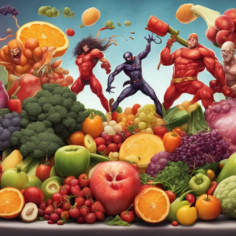
The journey to a healthier lifestyle often begins with the plate. From fruits and veggies to lean proteins and whole grains, nutrient-rich foods form the cornerstone of balanced eating. This comprehensive guide will take you through the importance of consuming nutrient-dense foods and how to seamlessly incorporate them into your dietary routine.
Importance of Nutrient-Rich Foods
Nutrient-rich foods are packed with vitamins, minerals, fiber, and other essential compounds. By consuming them, we can achieve better overall health, prevent chronic diseases, and improve our vitality and energy levels.
Current research indicates that diets rich in these foods can stave off obesity, diabetes, and cardiovascular diseases. Moreover, they’re linked to enhanced mental health, boosting mood and cognitive functions.
(Read Also: Perfectly Blended Life: Integrating Pets into your Lifestyle)
Choosing Nutrient-Rich Foods
While it’s easy to fall into the processed or ‘fast food’ trap, opting for whole and natural foods is pivotal. Optimally, your diet should encompass:
- Fruits and Vegetables: Loaded with essential vitamins and antioxidants, they can help prevent chronic illnesses.
- Whole Grains: Good sources of fiber and complex carbohydrates, they aid digestion and provide sustained energy.
- Lean Proteins: These include poultry, fish, eggs, and plant-based proteins like lentils and chickpeas which are crucial for cell growth and repair.
- Dairy: Opt for low-fat or non-fat versions to get your dose of calcium and Vitamin D.
- Healthy Fats: Avocados, oily fish, and nuts provide good fats that support heart health and reduce inflammation.
Incorporating Nutrient-Rich Foods
Incorporating these powerhouses into your diet isn’t as challenging as it might seem. Here are some simple tips:
- Plan Your Meals: Prepare a weekly meal plan that encompasses all food groups. Planning also reduces the chances of falling back on unhealthy options.
- Vary Your Choices: To prevent boredom and ensure a wide intake of nutrients, vary your food choices within each group.
- Healthy Snacks: Substitute processed snacks with healthier alternatives such as nuts, fruits, or yogurt.
- Portion Control: Even healthy foods can contribute to weight gain if consumed in large quantities. It’s all about balance!
(Read Also: Holistic Health: The Balanced Approach to Integrating Body, Mind, and Spirit)
Controversy and Balance
Although the merit of nutrient-rich foods is undisputed, controversies arise around ‘superfoods’, dietary supplements, and exclusion diets. While certain foods have high nutritional values, the key is to remember that balance and variety are integral to a healthy diet, not miracle foods or pills.
Your journey to a healthier, nutrient-rich lifestyle can be fulfilling and beneficial. Make the transition one step at a time and let wholesome, nutritious foods transform your well-being from the inside out.
Last modified: 11 January 2024


















